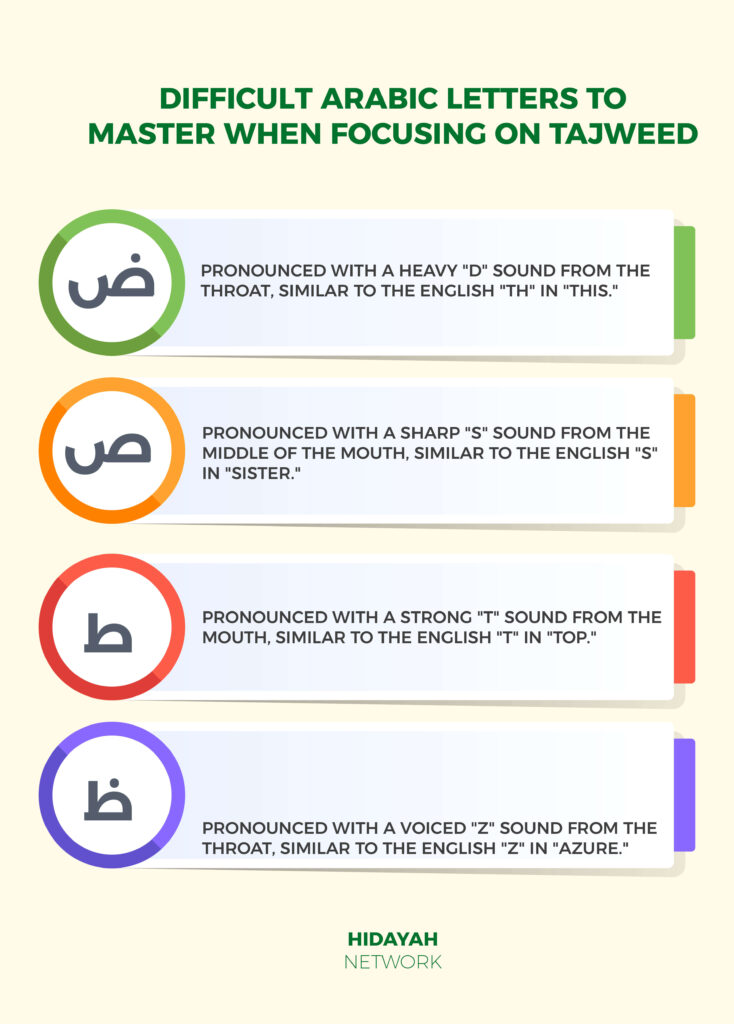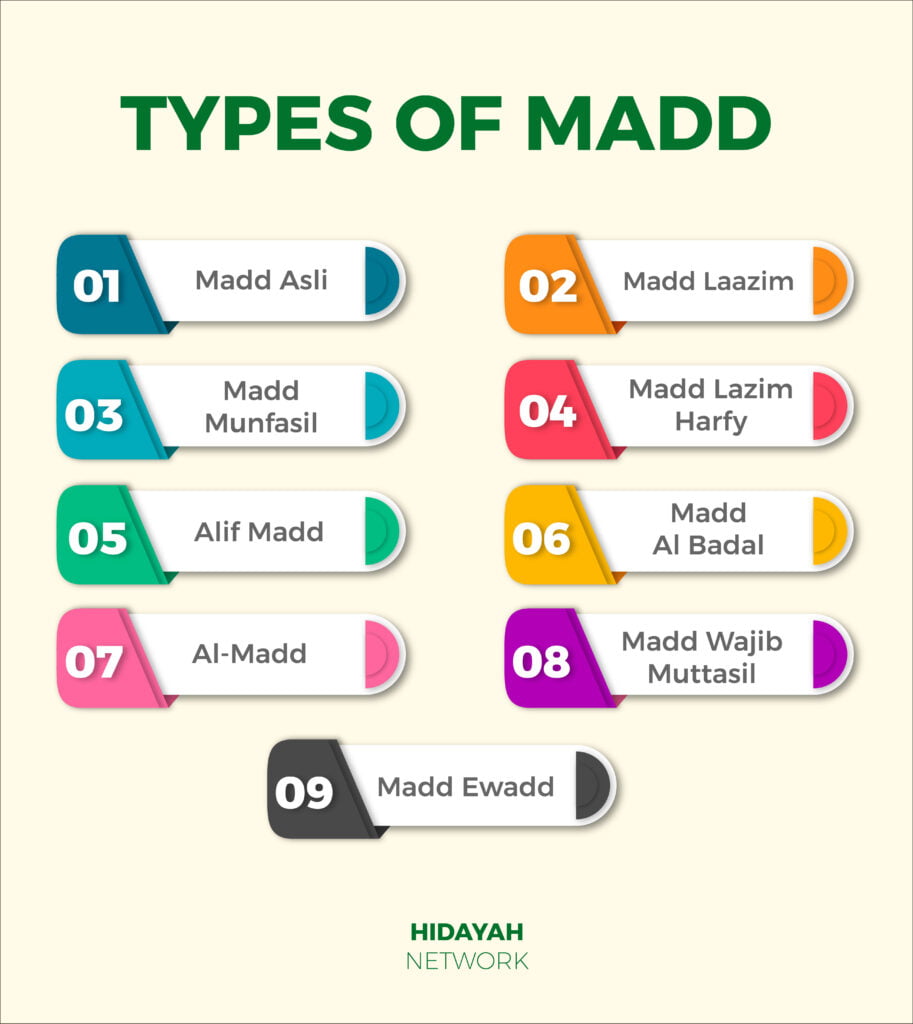Learning the Quran with Tajweed is ideal for beginners. It ensures that you have set out in the right direction right from the beginning when it comes to reading or reciting the Quran the way it should be. However, knowing where to begin as a beginner when learning Tajweed, and how to carry on with the process isn’t easy. But today, we will help you navigate all with ease.
You can start learning Tajweed as a beginner by learning the basic Arabic alphabet pronunciation, learning from the Noorani Qaida, focusing on mastering the Makharij, learning the characteristics of Sifaat, studying Qalqalah, as well as using a Tajweed app to track down the daily progress, and so on. Let’s truly show you how to implement these learning tips and guidelines into your daily Tajweed learning schedule.
Table of Contents
Toggle16 Tips to Learn Tajweed as a Beginner
1. Start with the Basic Arabic Alphabet Pronunciation Quickly
Quickly starting with the basics of Arabic alphabet pronunciation is essential when learning Tajweed. It helps beginners understand the sounds of Arabic letters, which are crucial for proper Quran recitation. This step lays the foundation for mastering Tajweed rules later. Some Arabic letters are more challenging for beginners to pronounce correctly.
The below is a table of difficult Arabic letters to master when focusing on Tajweed:
| Arabic Letter | Description of Pronunciation |
|---|---|
| ض (ḍād) | Pronounced with a heavy “d” sound from the throat, similar to the English “th” in “this.” |
| ص (ṣād) | Pronounced with a sharp “s” sound from the middle of the mouth, similar to the English “s” in “sister.” |
| ط (ṭāʾ) | Pronounced with a strong “t” sound from the mouth, similar to the English “t” in “top.” |
| ظ (ẓāʾ) | Pronounced with a voiced “z” sound from the throat, similar to the English “z” in “azure.” |

2. Learn Tajweed Rules Step-by-Step
Begin your Tajweed journey by mastering one rule at a time. For instance, focus on the rules related to the characteristics of each Arabic letter (Sifat). Practice pronouncing letters from their proper articulation points (Makharij), ensuring clarity in your pronunciation.
Take the time to understand and apply specific rules, such as the elongation (Madd) rules and the rules for stopping and starting in the Quranic text. Gradually progressing through each rule will build a solid foundation for advanced Tajweed.
The prophet Muhammad said: “Actions are (judged) by motives (niyyah), so each man will have what he intended. Thus, he whose migration (hijrah) was to Allah and His Messenger, his migration is to Allah and His Messenger; but he whose migration was for some worldly thing he might gain, or for a wife he might marry, his migration is to that for which he migrated.”
3. Begin Tajweed Sessions from Noorani Qaida
Beginning Tajweed sessions from Noorani Qaida means starting with a beginner-friendly book that teaches the basics of Quranic recitation.
Noorani Qaida introduces learners to Arabic letters, pronunciation rules, and Tajweed concepts gradually. It’s essential because it provides a structured approach to learning Tajweed, starting from the fundamentals, and gradually progressing to more advanced rules.
Some important chapters in Noorani Qaida that focus on Tajweed learning include:
- Introduction to Arabic alphabets and their pronunciation.
- Rules of elongation (madd) and vowel marks (harakat).
- Characteristics of letters (makharij) and articulation points.
- Rules of stopping (waqf) and continuation (ibtida).
4. Focus on Pronunciation by Mastering the Makharij
Focusing on pronunciation by mastering the Makharij means learning how to correctly produce the sounds of Arabic letters from their specific articulation points. This is crucial in Tajweed because each letter has a unique place in the mouth or throat where it originates, affecting its pronunciation.
Some important aspects of Makharij include:
- Identifying the point of articulation for each letter.
- Practicing the correct airflow and tongue placement.
- Differentiating between similar-sounding letters.
- Regularly practicing pronunciation exercises to strengthen articulation.
5. Learn the Characteristics of Letters (Sifat)
Learning the Characteristics of Letters (Sifat) involves understanding the unique features of Arabic letters that affect their pronunciation. These characteristics include attributes like heaviness, lightness, and elongation, which impact the sound and duration of pronunciation. It’s essential to learn Sifat because mastering these attributes ensures accurate Tajweed and improves Quranic recitation.
Pro Tip: Additionally, listening to proficient reciters and mimicking their pronunciation can help reinforce understanding and application of Sifat.
6. Study the Rules of Qalqalah
Studying the rules of Qalqalah involves understanding the phenomenon where certain Arabic letters produce a bouncing or echoing sound when pronounced with a sukoon (no vowel sound).
- Qalqalah occurs when one of the five Qalqalah letters (ق, ط, ب, ج, د) appears with a Sukoon (no vowel sound).
- The intensity of Qalqalah differs based on the strength of the letter:
- Ta/ط has the strongest Qalqalah.
- Qaf/ق, Baa’/ب, Jim/ج, and Dal/د exhibit progressively lighter Qalqalah.

Qalqalah is commonly used in specific Quranic verses, such as during pauses (waqf) or when reciting aloud, to enhance rhythm and clarity, making it crucial for accurate Quranic recitation.
7. Use a Tajweed App to Track Daily Progress
Using a Tajweed app to track daily progress is beneficial because it provides structured guidance and feedback on Quranic recitation, helping beginners improve their Tajweed skills consistently. These apps offer interactive features such as audio recitations, visual cues, and progress tracking, enhancing learning and motivation.
Here are three relevant apps for this:
- Quran Companion
- Tajweed Quran
- Tarteel
To achieve this as a beginner, follow these steps:
- Set daily goals for Quranic recitation and Tajweed practice.
- Use the app’s audio recitations to listen and mimic the correct pronunciation.
- Utilize the app’s feedback and progress-tracking features to monitor improvement over time.
- Make consistent efforts to practice Tajweed daily and review your progress regularly through the app.
This dedicated technique is ideal for learning Tajweed fast since it involves daily track down of progress and commitment.
8. Start Reading Tajweed from the Mushaf
Starting to read Tajweed from the Mushaf, especially from a color-coded Quran, is crucial for effective Tajweed practice. In a color-coded Quran, each letter containing a Tajweed rule is highlighted with a specific color, making it easier for readers to identify and apply the correct Tajweed rules as they recite.
This visual aid enhances understanding and application of Tajweed principles, helping readers improve their Quranic recitation accuracy. By practicing with a color-coded Mushaf, learners develop a strong foundation in Tajweed.

9. Familiarize Yourself with the Rules of Laam at-Tafkheem and Tarqeeq
Familiarizing yourself with the rules of Laam at-Tafkheem and Tarqeeq involves understanding two important Tajweed concepts:
Laam at-Tafkheem: This refers to the emphasis or strengthening of the letter “ل” (Laam) when it carries a Shaddah (gemination).
Tarqeeq: This refers to the lightening or softening of the letters “ت,” “د,” “ج,” “ز,” “س,” “ص,” “ض,” “ط,” and “ظ” (Ta, Daal, Jeem, Zay, Seen, Saad, Daad, Taa, and Dhaa) when they carry a Sukoon (no vowel sound).
These rules are important for beginners because they help in correctly pronouncing specific letters and combinations, improving overall Quranic recitation accuracy. Here are some basic rules:
- Laam at-Tafkheem occurs when the letter “ل” (Laam) carries a Shaddah (gemination), indicating a heavier pronunciation.
- Tarqeeq softens the pronunciation of certain letters when they carry a Sukoon, making them lighter in sound.
10. Record Your Tajweed Audios and Look Where You Need to Improve
Recording your Tajweed audios and reviewing them is essential for improving Quranic recitation. It allows beginners to hear their own recitation, identify mistakes, and track progress over time.
By listening to recorded audios, learners can pinpoint areas where they need improvement, such as pronunciation, rhythm, or adherence to Tajweed rules. Beginners should focus on practicing Tajweed rules related to Makharij (pronunciation points), Sifat (characteristics of letters), and Qalqalah (echoing sound) when using this technique.
Here are specific steps for beginners:
- Choose a quiet space for recording.
- Recite a short passage from the Quran.
- Record your recitation using a smartphone or recording device.
- Listen to the recording attentively, focusing on pronunciation and Tajweed rules.
- Identify areas for improvement and take note of them.
- Practice those specific rules repeatedly until improvement is noticeable.
11. Understand the Different Types of Madd
Understanding the different types of Madd in Tajweed is crucial for correct Quranic recitation. Here’s a brief explanation of each type:
- Madd Asli: Natural elongation, where a vowel is held for two counts.
- Madd Laazim: Compulsory elongation due to specific rules, such as a Sukoon followed by a letter with a Shaddah.
- Madd Munfasil: Separate elongation, occurring when a letter with a Sukoon is followed by a vowel.
- Madd Lazim Harfy: Elongation due to a specific letter, like Alif, which can be prolonged without any additional vowel sign.
- Alif Madd: Prolongation by adding an Alif after a letter with a Sukoon.
- Madd Al Badal: Substitution elongation, where a short vowel is replaced by a longer one.
- Madd Wajib Muttasil: Compulsory continuous elongation, where two identical letters meet with a vowel in between.
- Al-Madd: General term for elongation.
- Madd Ewadd: Elongation due to the repetition of specific letters.

Note: Madd Asli and Madd Lazim are used more frequently. Understanding Madd is vital as they affect the rhythm and flow of Quranic recitation, ensuring adherence to Tajweed types and preserving the beauty of the Quran.
12. Start Applying the Tajweed Rules in Short Surahs
Starting to apply Tajweed rules in short surahs is important for beginners as it allows them to practice and master the rules gradually. Short surahs provide manageable content for beginners to focus on specific Tajweed rules, improving their recitation accuracy and fluency.
Surahs like:
- Surah Al-Ikhlas
- Surah Al-Falaq
- Surah An-Nas
- Surah Al-Kawthar
are ideal for practicing Tajweed rules due to their brevity and simplicity. Some rules that beginners should focus on applying in these surahs include:
- Madd
- Qalqalah
- Noon and Meem Mushaddadah
- Ikhfa
- Ghunnah
Pro Tip: To achieve this technique, start with shorter surahs and gradually move on to longer ones as their confidence and proficiency increase.
13. Listen to Professional Reciters for Pronunciation Guidance
Listening to professional reciters for pronunciation guidance is a valuable technique for improving Tajweed. Beginners can do this by accessing online platforms, such as YouTube or Quran apps, where recordings of professional recitations are readily available. Three famous reciters known for their precise pronunciation and beautiful recitation are:
- Sheikh Mishary Rashid Alafasy
- Sheikh Abdul Rahman Al-Sudais
- Sheikh Saad Al-Ghamidi
To closely imitate these reciters, beginners can follow these steps:
- Choose a short passage or surah recited by the preferred reciter.
- Listen to the recitation attentively, paying close attention to pronunciation and rhythm.
- Repeat after the reciter, trying to match their tone, pace, and articulation.
- Practice repeatedly until the recitation is accurately imitated.
- Record your own recitation and compare it with the original to identify areas for improvement.
14. Recite Slowly and Deliberately to Focus on Correct Pronunciation
To recite slowly and deliberately to focus on correct pronunciation, follow these steps:
- Choose a short passage or surah from the Quran.
- Take a deep breath and start reciting slowly, paying close attention to each word.
- Pronounce each letter clearly and distinctly, focusing on correct articulation.
- Pause between words to ensure accuracy and avoid rushing.
- Continue reciting at a steady pace, maintaining mindfulness and concentration.
Pro Tip: Use a metronome or rhythmic counting to maintain a consistent pace while reciting slowly. This helps in developing a sense of rhythm and ensures steady progress in mastering Tajweed.

15. Use Tajweed Guides and Resources for Reference
Using Tajweed guides and resources for reference is crucial for beginners as they navigate the intricacies of Quranic recitation. These resources provide clear explanations, examples, and illustrations of Tajweed rules, helping beginners understand and apply them effectively.
Some relevant resources, other than famous names and apps, include:
- Tajweed Made Easy by Abdul-Majid Bhurgri.
- The Science of Tajweed by Jamal-un-Nisa Bint Rafai
- Tajweed Rules of the Quran by Kareema Carol Czerepinski
- Tajweed Quran with English Translation and Transliteration by Dar Al-Maarifah
- Tajweed Rules for Qur’anic Recitation: A Beginner’s Guide by Jawdat Haydar
These books offer comprehensive guidance and exercises for beginners to learn and master Tajweed principles at their own pace.
16. Join Tajweed Classes or Find a Qualified Tutor
Joining Tajweed classes or finding a qualified tutor is crucial for beginners as it offers personalized guidance and structured learning, ensuring effective mastery of Tajweed principles. Some key features of this purpose include:
- Direct feedback and correction from an experienced tutor help in identifying and rectifying mistakes.
- Interactive sessions allow for hands-on practice and clarification of doubts in real time.
- A structured curriculum covers Tajweed rules comprehensively, ensuring a systematic learning experience.
- Group discussions and peer learning provide additional support and motivation for beginners.
- Customized lesson plans cater to individual learning needs and pace, facilitating effective progress.
Why Should You Learn Tajweed?
There are many reasons for learning Tajweed as a beginner:
Accurate Recitation
Learning Tajweed ensures that beginners recite the Quran accurately, preserving the integrity of its message and avoiding errors in pronunciation.
Understanding Meaning
By mastering Tajweed, beginners can comprehend the precise meanings of Quranic verses, as correct pronunciation is essential for understanding.
Respect for the Quran
Tajweed instills a deep respect for the Quran, emphasizing the importance of reciting it with reverence and care.
Spiritual Connection
Proper recitation through Tajweed strengthens beginners’ spiritual connection with the Quran, fostering a deeper sense of spirituality and closeness to Allah.
Avoiding Misinterpretation
Tajweed rules prevent misinterpretation of Quranic verses caused by incorrect pronunciation, ensuring that beginners convey the intended message accurately.
How Long Does It Take to Learn Tajweed?
The time it takes to learn Tajweed varies depending on factors like a child’s aptitude and the frequency of lessons. Typically, beginners can grasp the basics of recitation in 6 to 9 months with consistent practice of 2 hours per week. For children who dedicate more time, say 3 to 4 hours per week, mastery may come in 4 to 6 months.
Conversely, learners who can only manage shorter sessions, like 1 hour per week, might take around 12 to 18 months to become proficient. Consistent practice at home is crucial regardless of the duration, ensuring steady progress in mastering Tajweed.
What is the Best Way to Learn Tajweed?
The most effective way to learn Tajweed is through personalized instruction from a qualified tutor. Unlike self-study methods, a tutor offers direct feedback, correction, and guidance tailored to individual learning needs. This one-on-one interaction allows for immediate clarification of doubts, ensuring comprehensive understanding and application of Tajweed rules.
Additionally, tutors can customize lesson plans and pacing to suit the learner’s progress, maximizing efficiency and effectiveness in Tajweed mastery. The personalized attention and tailored instruction provided by a qualified tutor make it the strongest and most unique approach to learning Tajweed.

How to Learn the Quran with Tajweed at Home?
Designate a quiet and comfortable area in your home specifically for Tajweed practice. Eliminating distractions and establishing a conducive learning environment can improve focus and concentration, leading to more effective learning outcomes.
In addition, utilize a mirror to observe mouth and tongue movements while reciting Quranic verses. This visual feedback helps beginners correct pronunciation and ensure proper articulation of Tajweed rules.
There’s a lot more we’ve discussed in our blog about learning the Quran with Tajweed at home. Be sure to visit for maximum guidance.
Conclusion
Learning Tajweed is a journey of dedication and reverence for the Quran. With patience and perseverance, beginners can embark on this rewarding journey, enriching their spirituality and understanding of Islam. Tajweed is not just about recitation; it’s about embodying the essence of the Quran in every word uttered.
Most Important Questions
Is Tajweed mandatory for the Quran?
Tajweed is not mandatory for reading the Quran, but it is highly recommended for correct pronunciation and understanding of the Quranic text.
What are the benefits of reciting the Quran with Tajweed?
Reciting the Quran with Tajweed helps improve pronunciation, enhances understanding of the text, and earns spiritual rewards, making the reading more meaningful.
Why is it important to learn Tajweed?
Reciting the Quran with Tajweed helps improve pronunciation, enhances understanding of the text, and earns spiritual rewards, making the reading more meaningful.
What is the reward of Tajweed?
The reward for reciting the Quran with Tajweed includes spiritual blessings, increased understanding of the Quran, and the potential to earn a higher status in the Hereafter.
How to memorize the Quran with Tajweed?
To memorize the Quran with Tajweed, seek guidance from a qualified teacher, practice regularly, and recite to someone knowledgeable for feedback and correction. Consistency and dedication are key.

About Author

